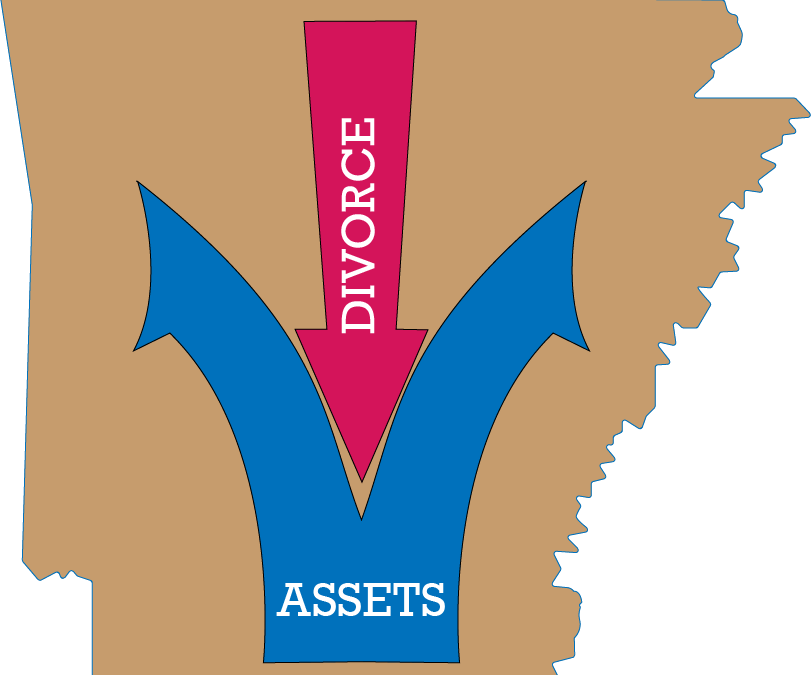What are assets?
We divide assets into non-tangible things such as bank accounts, retirement accounts, investment accounts, stocks, bonds, and mutual funds, as well as high value assets such as cars, ATVs, motorcycles, boats, trailers and anything else with a title to indicate ownership. When you’re married, regardless of whose name the asset is in, all assets acquired during the marriage, or co-mingled with marital assets, are considered marital property, and subject to equitable division between the parties. This concept allows a fairness that un-married couples do not enjoy in the break up of their relationships.
How does dividing the assets work?
When both parties are roughly equal income-producers, household contributors, children supporters, and retirement savers, it’s easy to say everyone just keeps what’s in his or her own name. The issue is when one party is the primary income producer, and the other party didn’t work outside the home, for whatever reason. In that situation, the income producer’s assets need to be divided equitably with the non-income producer from a fairness standpoint.
When you first file for divorce, typically a “standing restraining order” is entered, which forbids any party from divesting him or herself from assets owned, to prevent having to share the asset with the other party.
Asset division is a global analysis. It is not advisable to divide them on an asset by asset basis. The goal is for each party to walk away with roughly the same value in assets, not the same number of accounts or cars, for example.
Special Considerations
Some asset divisions – such as retirement accounts – require special steps, which add cost to the overall expense of a divorce. One of our main goals as your legal representatives is to keep the headaches and cost of the divorce down. Lion Legal can help guide an equitable division of assets, while also not incurring unnecessary costs and expenses that can mount up when dividing accounts on an asset by asset basis. Retirement accounts have broad tax implications, and if the accounts are set up in only one spouse’s name (which is always the case when the accounts are employer sponsored such as SIMPLE IRAs or 401(k) plans), then a Qualified Domestic Relations Order may be necessary. We discuss QDROS here.
What’s reasonable?
In the context of asset division, it is important to consider the reasonableness standard. If both parties can stay reasonable, we can divide assets fairly and painlessly. Each of you should receive about 50% of the marital assets to move on with life, because in a marriage you each are considered to have contributed 50% to the union, even if your contributions were different.
There are some factors that may change the analysis of what’s reasonable, and allow us to argue that one spouse should be entitled to more than 50% of the marital assets. These factors include:
- length of the marriage
- each party’s age, health, and station in life
- each party’s occupation
- each party’s sources of income, and how much income is available
- vocational skills
- employability
- estate, liabilities, and needs of each spouse and each spouse’s opportunity for further acquisition of capital assets and income
- each spouse’s contributions to the acquisition, preservation, or appreciation of marital property, including services as a homemaker
- federal income tax consequences of the property division
What is a marital asset?
Typically, anything acquired during the marriage is considered marital, including one spouse’s income and retirement contributions and investments. Inheritances are not considered marital, but if you “co-mingle” them with other marital assets, they can turn into marital assets.
Sometimes spouses will try to shield assets from equitable division. One fairly common way is to place assets in someone else’s name (a parent or sibling, perhaps) so they can argue that it is not their asset at all, and thus not subject to consideration in the division of assets.
Bottom Line
Dividing assets is complicated, and there are no consistent rules to simplify it. Having a great attorney on your side is critical in obtaining a positive and fair result for yourself in a divorce.
When preparing for your first meeting, you should make a detailed list of all assets of both parties of the marriage without regard to whose name that the asset is in, or even if it’s in the name of one of the spouses.
We Can Help
Our attorneys are experts, and are here for you with straight talk, predictable cost, and superior services. We promise to tell you what the most likely outcome is up front, and to be open and transparent in our communications with you until your case is resolved.
Our approach to practicing law is revolutionizing the way law firms deliver legal services. Case evaluations are completely free. Call Lion Legal today at (501) 227-7627 or Email Us to set up a free consultation.

